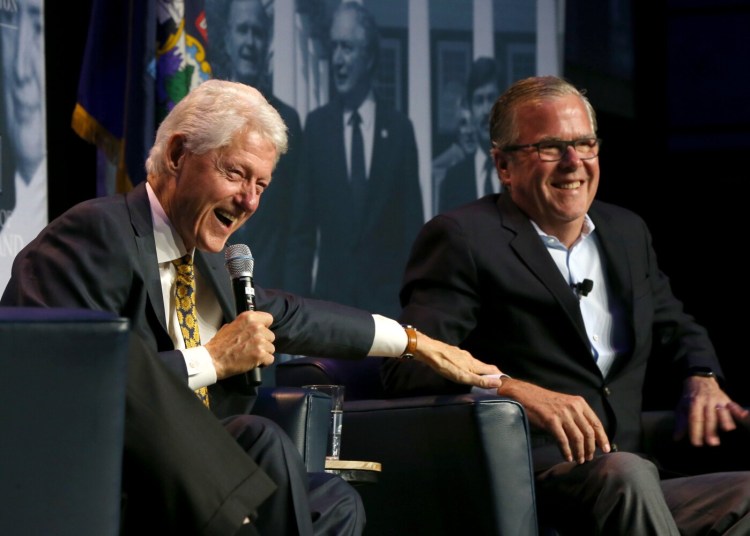BIDDEFORD — The goals of the 1989 Education Summit may never be attained, but for former Florida Gov. Jeb Bush the enduring lesson of the historic gathering organized by his father was the example the nation’s leaders set when they put aside their differences to work for the common good.
“The legacy of Charlottesville is an important one,” Bush said during a discussion hosted Friday at the University of New England. “Aside from the lofty aspirations to make this a priority, you had every governor coming together in a totally bipartisan, nonpartisan way to say this is important to do for our country.”
The summit, called by former President George H. W. Bush, was held on the University of Virginia campus in Charlottesville, Virginia, and attended by 49 of the nation’s 50 governors.
It was just the third time a U.S. president called for a summit of state leaders and the only summit to address education and how to reform America’s schools.
Out of the meeting, the governors set six lofty goals for reforming the U.S. education system.
• By 2000, every child should start school ready to learn.
• The high school graduation rate must increase to 90 percent.
• Performance ought to be assessed in fourth, eighth and 12th grades.
• Every U.S. adult should be a skilled, literate, lifetime learner.
• Each school should establish a safe, disciplined and drug-free environment.
• And by 2000, U.S. students should be first in the world in science and math.
While the goals have yet to be met, the summit is credited with providing a direction for the the nation’s education policy and setting the foundation for standards-based reform.
On Friday, Jeb Bush joined former President Bill Clinton, who helped organize the summit while he was governor of Arkansas, at UNE’s Harold Alfond Forum.
The lecture was part of the George and Barbara Bush Distinguished Lecture Series at the university and was put on in conjunction with the George & Barbara Bush Foundation.

Former president Bill Clinton and former Florida governor Jeb Bush appear at the George and Barbara Bush Distinguished Lecture Series on Friday at the University of New England. Ben McCanna/Staff Photographer
The speakers, who also included Harvard University professor Roger B. Porter, former chief domestic and economic policy adviser to President Bush, spoke at no cost to the university.
“This was the first time we had national goals, the first time we all said we have to restructure the school system,” Clinton said. “And then you have all these politicians who like to talk more than they like to do. And there really were all of us saying … ‘We commit to being held personally accountable to what this is doing.'”
At the time governors across the country and particularly in the South were working to respond to the Reagan administration’s 1983 report, A Nation at Risk, which called for dramatic improvements in the U.S. education system.
“Every challenge in American education had been met by someone somewhere. We couldn’t find anything where a school somewhere wasn’t performing at worldwide levels,” Clinton said. “But we couldn’t replicate it. We needed a boost.”
The governors wanted something concrete to come out of the summit, so they also agreed to a 1989 Education Summit statement endorsing the national goals. Looking back, Clinton said it wasn’t hard to get all the governors to agree on the statement.
“President Clinton and my dad set the example for how to agree on things despite difference,” Bush said.
He said the summit helped set standards and establish the idea of accountability that he later applied as governor of Florida. Today, Bush said if there’s one measure of student success that matters the most it’s to ensure all students can read by the end of third grade.
He also praised the idea of school choice, saying school choice via charter schools, vouchers and robust private schools has provided incentive for Florida public schools to improve.
Clinton, meanwhile, said while he supports charter schools that are performing at or above the level of traditional public schools and for which there is demand, he also would like to see successful charter schools work more closely with traditional schools on best practices.
The Charlottesville summit and what came out of it “put us on a very long road and we’re still trying to figure out financial questions, accountability and culture questions,” Clinton said.
To be successful, he said schools also need to focus more on creating cultures of strong leadership and parent engagement and make sure teachers are paid well and retained.
The summit, he said, was also one of the first times leaders started realizing they need to prepare children for school before kindergarten.
“We probably should do this for our education system at least every 30 years,” Clinton said. “It didn’t matter if we agreed. Everybody was committed to making a difference for building our future.”
Clinton, who survived impeachment, never mentioned Republican President Trump or the impeachment probe against him.
This report contains material from The Associated Press.
Comments are not available on this story.
Send questions/comments to the editors.



